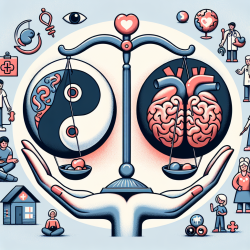Understanding Dualism and Its Impact on Your Practice
As practitioners in the field of special education and therapy services, it's crucial to understand the philosophical underpinnings that can impact our practice. One such concept is dualism, which has been a topic of debate and confusion within the medical community. The research article "Medicine’s Metaphysical Morass: How Confusion About Dualism Threatens Public Health" by Diane O'Leary provides valuable insights into how these philosophical concepts can affect patient care and what we can do to improve our practice.
The Dualism Dilemma
Dualism, in its traditional sense, refers to the idea that the mind and body are separate entities. This concept has been a foundational element in the development of medical models. However, confusion arises when dualism is conflated with reductionism, the idea that complex phenomena can be explained by reducing them to their simplest components. The research highlights that this confusion can lead to a "quality-of-care crisis," where patients are treated as mere bodies rather than as whole persons.
Holism: A Nonreductive Approach
The article advocates for a nonreductive approach to medicine, known as holism. This approach emphasizes the importance of considering biological, psychological, and social dimensions of illness. For practitioners, this means recognizing the patient's subjective experiences as integral to their care. By adopting a holistic approach, we can ensure that we are not only addressing the physical symptoms but also the mental and emotional well-being of our patients.
Implementing Holism in Practice
To implement a holistic approach in your practice, consider the following steps:
- Integrate Multidisciplinary Teams: Collaborate with professionals from various fields to address the diverse needs of your patients.
- Focus on the Whole Person: Engage with patients to understand their experiences and how they affect their health.
- Educate Yourself and Your Team: Stay informed about the latest research and philosophical discussions that impact patient care.
- Encourage Open Communication: Foster an environment where patients feel comfortable discussing their mental and emotional health.
Encouraging Further Research
While the article provides a comprehensive overview of the issues surrounding dualism and holism, it also encourages practitioners to engage in further research. By doing so, we can continue to refine our understanding and improve the quality of care we provide.
To read the original research paper, please follow this link: Medicine’s metaphysical morass: how confusion about dualism threatens public health.










